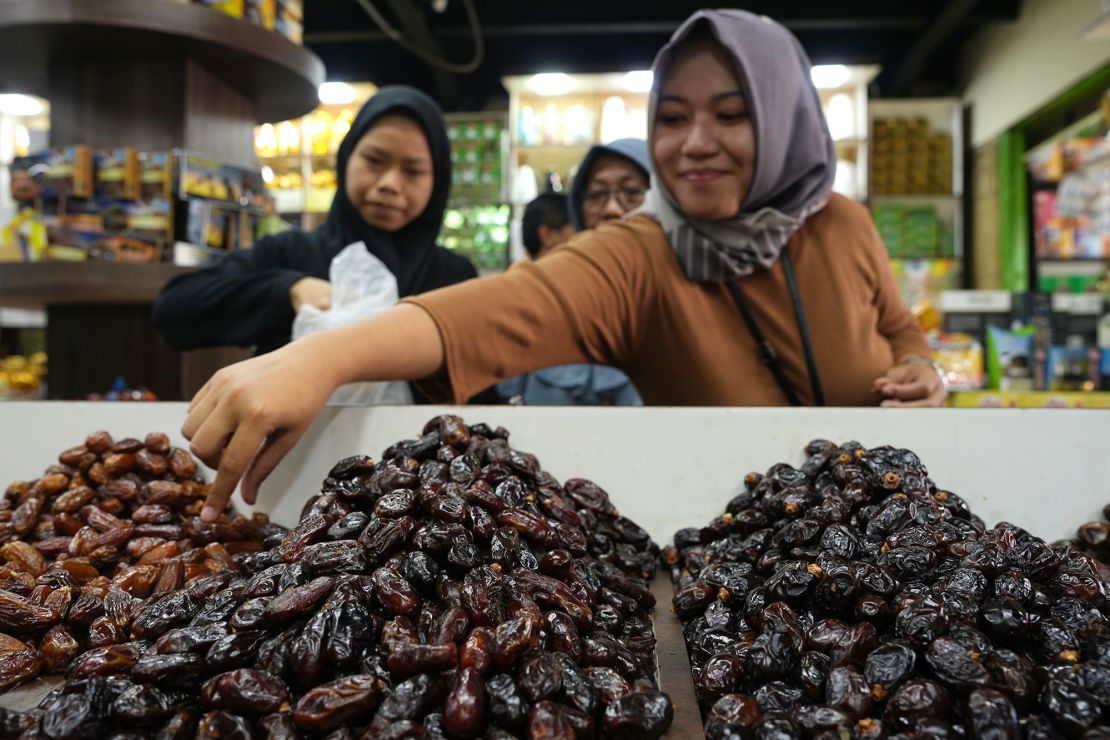CNN
—
Get inspired by a weekly roundup on living well, made simple. Sign up for CNN’s Life, But Better newsletter for information and tools designed to improve your well-being.
For many Muslims around the world, the holy month of Ramadan is a time for spiritual reset. Fasting during the month may be one of the most physically difficult challenges to endure. Muslims refrain from consuming any food or liquid from dawn until sundown — when one can break the fast and share the experience at an evening meal with family and friends.
Fasting for religious observance can be fulfilling, but it does require planning and sacrifice. It typically means stepping outside one’s usual eating and drinking routine, and that change causes some people to neglect their health. Abstaining from food and drink during the fast calls for discipline and may require you to plan ahead if you take medications at certain times throughout the day.
If you’re committed to fasting this Ramadan, here are some expert-backed ways to ensure you’re getting enough nutrients and hydration this Ramadan season.
Are you healthy enough to fast?
The main question for people interested in fastingshould be if it’s safe for you to do so.If people are sick and fasting would worsen their conditions, Islam advises that they should refrain from it.
TOPSHOT – Muslim worshippers pray around the Kaaba, Islam’s holiest shrine, at the Grand Mosque in the holy city of Mecca on the first day of Eid al-Fitr, which marks the end of the holy fasting month of Ramadan on April 21, 2023. (Photo by Abdel Ghani BASHIR / AFP) (Photo by ABDEL GHANI BASHIR/AFP via Getty Images)
Related article
Ramadan begins with the crescent moon. Here’s why the official start time can still vary around the world
So ask yourself, “Am I in shape for it?” said Dr. Michael Perskin, a geriatrician and internal medicine doctor at NYU Langone.
Depending on one’s lifestyle and other characteristics, fasting might be harder on some than others.
“Let’s say someone’s 75, and they run marathons, and they don’t take any medicines. They probably can fast because they put their body under stress regularly,” Perskin said.
“Compare that to a 75-year-old who has diabetes, hypertension, was screened for cancer last year, and their physical activity is getting up from a chair and going to the bathroom or the dining room table. They probably shouldn’t fast,” he said.

Some people find creative ways to consume some of their daily water, such as through fruits and vegetables.
Lack of water can lead to health issues
It can be challenging to stay hydrated when drinking hours are limited to overnight between sunset and dawn — but your body needs that water.
“A mistake that many people make when they’re going through Ramadan is not drinking enough water, which could lead to digestive issues, dehydration and not feeling that great,” said Nazima Qureshi, a Toronto-based registered dietician and coauthor of “The Healthy Ramadan Guide.”
Dehydration can first cause problems that can be addressed early on, Perskin said, but if it continues it can cause real damage.
“The problems could be (feeling) lightheadedness, irritability, fatigue, headache, sluggish,” he noted. If those symptoms aren’t treated, people can get dehydrated to the point of passing out, falling and hitting their head or breaking a bone, he added.
If you have underlying mild heart disease, dehydration could increase your heart rate and then could lead to an acute cardiac event or a stroke, Perskin said.
Kidney health is also closely tied to water consumption.
“The kidney is the main organ that gets rid of the fluids that we ingest during the day,” said Dr. Lama Nazzal, a nephrologist and associate professor at NYU Grossman School of Medicine, adding thatlack of sufficient water over time can lead to reduced kidney function.
Pre-hydrate or drink water into the night
Perskin advises pre-hydrating before beginning thefast rather than waiting until the evening to catch up on all the water.
Additionally, “just like you would train for a marathon – a few days before, maybe drink some extra water. Have some extra fruit and vegetables,” he added.
Drinking well into the night is another option, according to Nazzal. Once people break their fasts after sunset, they should continue drinking water through the night, she said.
Related article
A Ramadan etiquette guide for non-Muslims
“They should not drink only when they feel thirsty. They should just drink fluids in general,” Nazzal added.
While experts vary on their water intake recommendations, the National Academy of Medicine recommends that women consume 2.7 liters of fluids daily and that men have 3.7 liters daily. (Nearly 50% of people around the world, however, don’t meet these recommendations on a regular basis.)
Qureshi advises that people drink the same amount of water on fasting days as they would on a regular day—and to aim for a certain amount.
“In that early morning meal, you want to get anywhere from 500 to 750 milliliters of water. When you break your fast you want to aim for 500 milliliters, and then you have the evening hours,” she said. A bottle or cup of water that’s 16.9 ounces is equal to 500 milliliters.
Older adults generally don’t drink enough water, Perskin said, and some don’t because they can slightly lose their sense of thirst. So, it’s even more important that they drink more water during Ramadan.
Get creative with your fluid intake
If you’re bored with the traditional cup of water, try opting for a flavored variation or even incorporate foods that will help deliver some of that liquid too.
“You could definitely go for high-water content fruits and vegetables, so things like your watermelon, cucumbers, citrus,” said Qureshi, but that’s in addition to water. “At the end of the day, nothing will replace water.”
Qureshi suggests twists to make plain water more interesting.
“Squeezing in a bit of lemon with a pinch of sea salt with a little bit of electrolytes — that could be a good option. Or flavoring your water naturally with lemon slices or mint — that would probably be a nice refreshing option as well,” she said.

Dates contain electrolytes, which help with hydration.
Electrolytes “contribute to better hydration,” registered dietitian Melissa Majumdar previously told CNN in regards to a study.
Add foods that fuel energy
Qureshi emphasizes the importance of packing in some protein and fiber during suhoor, which is the early morning meal before your daily fast begins.
Generally, foods that give you energy are good choices, dietician Rahaf Al Bochi said in a previous CNN article. “Examples are eggs, avocados and toast, overnight oats, Greek yogurt bowls, protein waffles and burritos stuffed with beans and eggs,” she said.
Energy-packed dates are also a traditional food for Ramadan.
“Around the world everyone is opening their fast with dates, and the great thing is there are nutritional benefits,” Qureshi said. “After a long day of fasting there’s potassium, magnesium (in dates). There’s electrolytes as well.”
Afghan men shop for livestock at a market ahead of the Eid al-Adha festival, on the outskirts of Jalalabad, Afghanistan, on August 29, 2017.
Related article
What this holiday of sacrifice teaches us about mindfulness
Find equilibrium during Ramadan
Fasting for Ramadan can be a dance between managing one’s physical health and water intake, and also fulfilling personal religious goals. Make sure your health is in a good spot for you to fast. Islam advises people fast if they are healthy enough to do so. Then, take responsible steps to refuel both before sunrise and after breaking fast.

















